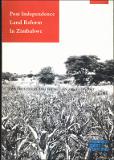| dc.contributor.author | Moyo, Sam | |
| dc.coverage.spatial | Zimbabwe. | en |
| dc.date.accessioned | 2016-03-21T15:45:04Z | |
| dc.date.available | 2016-03-21T15:45:04Z | |
| dc.date.issued | 2004 | |
| dc.identifier.citation | Moyo, S. (2004) Land movements and the democratisation process in Zimbabwe: contradictions of neo-liberalism. In: Masiiwa, M. (ed.) Post-independence land reform in Zimbabwe: controversies and impact on the economy. Harare: Friedrich Ebert Stiftung and Institute of Development Studies, University of Zimbabwe, pp. 193-216. | en |
| dc.identifier.isbn | 0797427864 | |
| dc.identifier.uri | https://opendocs.ids.ac.uk/opendocs/handle/20.500.12413/10198 | |
| dc.description | A treatise on the politics behind Zimbabwe's land reform programme. | en |
| dc.description.abstract | The high profile land occupations in Zimbabwe from 1998 onwards are a manifestation of a much larger phenomenon currently underway across the South. In Latin America and Asia, as well as in other African countries, there has been a resurgence of mass land occupations in the 1990s (James Petras, 1997, Satumino M. Borras, 1998, Sam Moyo et al). While iocai and national differences may be observed, these movements share common grievances arising from unresolved land questions (agrarian questions more broadly). They share also a common location in the development dialogue as ‘rural poor’ and as subject to welfarist ‘rural development’ programmes. And they share their effective exclusion from a ‘civil society’ that conforms to the ‘proper’ procedure and content of ‘oppositional’ politics in accordance with the liberal formula. This formula values ‘independent’ civic organisation, where ‘independent’ means dissociation from the state, not donors; 'multi-party democracy’, at a time when political parties can no longer differ in their substantive (neoliberal) politics; and respect for the ‘rule of law’, defined by private property, ‘independent’ judiciary (meaning bourgeois), and free’ press (meaning private). The liberal formula has been deployed world-wide in the 1990s throughout the liberalising world, has gained ready adherence by national bourgeoisies and has co-opted organised working class politics. It should come as no surprise therefore that, along with deepening poverty and proliferating rural violence over the last two decades, there have emerged both organised and spontaneous rural movements, outside the ‘civil’ framework, seeking to transform inherited property regimes, as well as national policy-making processes (Christobal Kay, 2000, Mats Berdal and David Keen, 1997). | en |
| dc.description.sponsorship | Friedrich Ebert Stiftung Foundation. | en |
| dc.language.iso | en | en |
| dc.publisher | Friedrich Ebert Stiftung and Institute of Development Studies, University of Zimbabwe, Harare, | en |
| dc.rights.uri | http://creativecommons.org/licenses/by-nc-nd/3.0/ | en |
| dc.subject | Politics and Power | en |
| dc.subject | Rights | en |
| dc.title | Land movements and the democratisation process in Zimbabwe: contradictions of neo-liberalism | en |
| dc.type | Book chapter | en |
| dc.rights.holder | © This collection: Medicine Masiiwa, Friedrich Ebert Stiftung and Institute of Development Studies, University of Zimbabwe | en |


